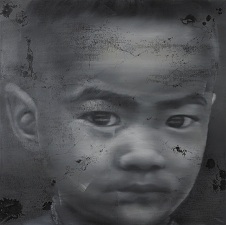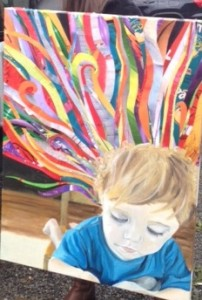While artist Matthew Day Jackson and Bucknell professors John Hunter and Harold Schweizer all seemed to bring very different perspectives to the panel surrounding Dusk to Dusk, the common thread that tied their ideas together seemed to be the concept of “noise”. Their definition, however, is not “noise” in the traditional sense of the word. The panelists described “noise” as the messages, media, and technology that we cannot live without and that surround us in our daily lives.
At one point in the discussion, Professor Hunter provided an anecdote of a student who could not bear to live without her iPhone by her side (something I think a lot of the audience members could identity with), and then motioned to the work, Media Enfant No. 3 by Chinese artist Tianbing Li.

From a distance, the work seems to be a black and white image of a young boy, covered by a variety of smudges to the canvas. Upon further glance, however, these smudges become Chinese characters covering the boy’s face. These characters then become the “noise” of smartphones, the news, and the Internet that effectively disrupt personal interaction with the child.
Grace Toolan, a senior completing an independent study in Studio Art, is currently working on a project that demonstrates a very similar message to Tianbing Li’s painting. Her artwork explores the early childhood perspective through portraiture and collage. For the first installment, Grace spent an afternoon with her 2-year-old cousin, and took photos of the objects that surround him. By chance, the objects all seemed to be plastic, graphic objects, such as diaper packages, plastic cups, branded stuffed animals, and even the Bucknell logo. She then painted a portrait of her cousin, and collaged the photographs into how she believed his thoughts would appear visually.

The similarity between both Tianbing Li and Grace Toolan’s work exists in their acknowledgement of the noise that surrounds children, starting at a young age. Both artists also seem to disguise this message: Grace through assembling the photographs in an unrecognizable form and Li through creating an effect only decipherable from a short distance away from the work. What does it say about the present that two artists from across the world are picking up on this same concept?
